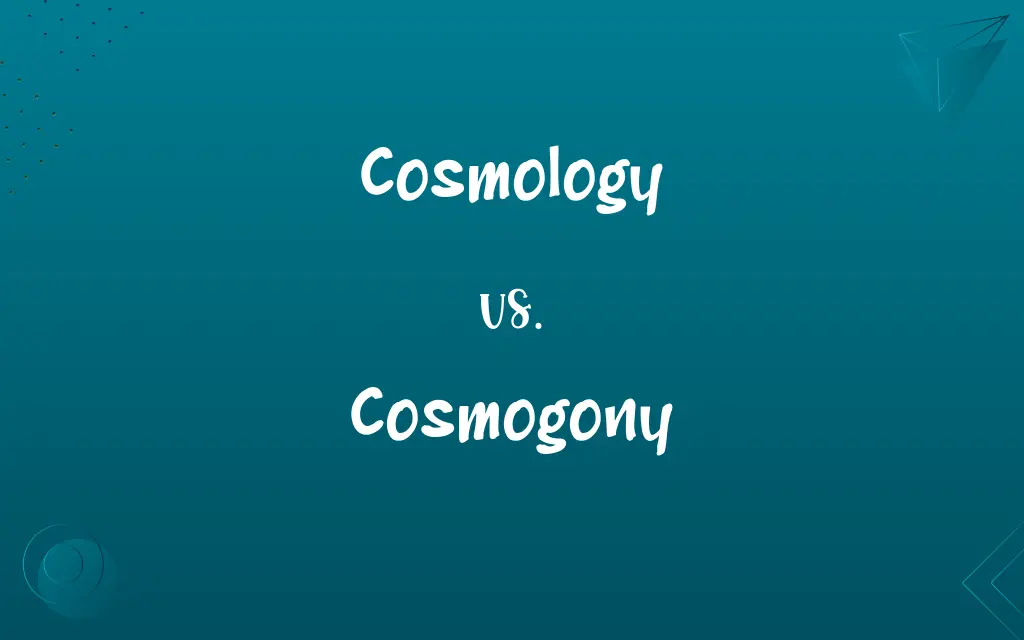Cosmology vs. Cosmogony: Know the Difference

By Shumaila Saeed & Dua Fatima || Published on September 8, 2024
Cosmology studies the universe's structure, origin, and evolution, focusing on laws and theories, while cosmogony delves into specific myths, beliefs, and theories about the universe's creation.

Key Differences
Cosmology is a branch of astronomy that deals with understanding the universe's large-scale properties, its evolution, and its ultimate fate, relying on empirical evidence and mathematical theories. It encompasses both the physical laws that govern celestial bodies and the overall structure of the cosmos. Cosmogony, on the other hand, refers to the study of the origin of the universe, including scientific theories like the Big Bang, as well as myths, religious beliefs, and philosophical concepts about how the universe came into being.
Shumaila Saeed
Sep 08, 2024
While cosmology is grounded in scientific methods, employing observations and theoretical physics to build and test hypotheses about the universe as a whole, cosmogony can be seen as more speculative or narrative-driven, blending science with cultural, religious, and mythological accounts of the universe's creation. For instance, cosmology uses data from telescopes and space missions to understand phenomena like dark matter and cosmic microwave background radiation, whereas cosmogony might explore the Big Bang alongside ancient creation myths.
Dua Fatima
Sep 08, 2024
The goals of cosmology are to produce a coherent and testable model that explains the universe's properties, such as its age, shape, and the distribution of galaxies. It seeks to answer questions about the rate of expansion of the universe and the nature of its contents. Cosmogony, while it may incorporate elements of cosmology, extends beyond scientific inquiry to include the exploration of cultural and existential questions about why the universe exists and its ultimate purpose or meaning.
Shumaila Saeed
Sep 08, 2024
Cosmology often involves complex mathematical models and theories, such as general relativity and quantum mechanics, to describe the universe's behavior from the very beginning to the present day. Cosmogony, while it can involve theoretical physics, also opens the door to philosophical and theological discussions about the cosmos's creation, offering a broader perspective that includes a variety of cultural narratives and personal beliefs.
Shumaila Saeed
Sep 08, 2024
Both fields, while distinct, intersect in their quest to understand our place in the universe. Cosmology provides the framework for understanding how the universe works and evolves, while cosmogony addresses the deeper, often unanswerable, questions about the origins and meaning behind the cosmic order.
Dua Fatima
Sep 08, 2024
ADVERTISEMENT
Comparison Chart
Focus
Structure, laws, and evolution of the universe
Theories and myths about the universe's creation
Shumaila Saeed
Sep 08, 2024
Methodology
Scientific, based on empirical evidence and mathematical theories
Includes scientific theories as well as myths, religious beliefs, and philosophical concepts
Dua Fatima
Sep 08, 2024
Scope
Universal laws and phenomena, like dark matter and cosmic expansion
Origin stories, including the Big Bang theory and creation myths
Shumaila Saeed
Sep 08, 2024
Objective
To create a testable model explaining the universe's properties
To explore cultural and existential questions about the universe's beginning
Hifza Nasir
Sep 08, 2024
Tools and Theories
Telescopes, space missions, general relativity, quantum mechanics
Philosophical discussion, theological concepts, alongside scientific inquiry
Shumaila Saeed
Sep 08, 2024
ADVERTISEMENT
Cosmology and Cosmogony Definitions
Cosmology
The scientific study of the universe's structure and evolution.
Cosmology seeks to understand the cosmic microwave background radiation.
Shumaila Saeed
Mar 06, 2024
Cosmogony
Explores cultural and religious beliefs.
Cosmogony looks at how different cultures explain the universe's creation.
Shumaila Saeed
Mar 06, 2024
Cosmology
Aims to explain universal laws and phenomena.
Cosmology addresses the rate at which the universe expands.
Shumaila Saeed
Mar 06, 2024
Cosmogony
Blends science with narrative-driven accounts.
Cosmogony bridges scientific understanding and mythological explanations.
Shumaila Saeed
Mar 06, 2024
Cosmology
Focuses on empirical evidence and theories.
Through cosmology, scientists explore dark matter and dark energy.
Shumaila Saeed
Mar 06, 2024
ADVERTISEMENT
Cosmogony
The study of the universe's origin, including myths and scientific theories.
Cosmogony encompasses both the Big Bang theory and ancient creation stories.
Dua Fatima
Mar 06, 2024
Cosmology
Uses data from telescopes and space missions.
The Hubble Space Telescope has contributed significantly to cosmological research.
Hifza Nasir
Mar 06, 2024
Cosmogony
Can include philosophical concepts.
Philosophical cosmogony discusses the purpose and meaning of the universe.
Dua Fatima
Mar 06, 2024
Cosmology
Involves mathematical models.
Cosmology uses general relativity to explain the universe's expansion.
Shumaila Saeed
Mar 06, 2024
Cosmogony
Addresses existential questions.
Cosmogony seeks to answer why the universe exists and its ultimate purpose.
Hifza Nasir
Mar 06, 2024
Cosmogony
A philosophical, religious, or mythical explanation of the origin of the universe.
Shumaila Saeed
Mar 05, 2024
Cosmology
The branch of astrophysics that studies the origin and evolution and structure of the universe
Shumaila Saeed
Mar 05, 2024
Cosmogony
The study of the origin, and sometimes the development, of the universe or the solar system, in astrophysics, religion, and other fields.
Dua Fatima
Mar 05, 2024
Cosmology
A philosophical, religious, or mythical explanation of the nature and structure of the universe.
Hifza Nasir
Mar 05, 2024
Cosmogony
The branch of astrophysics that studies the origin and evolution and structure of the universe
Shumaila Saeed
Mar 05, 2024
Cosmology
The astrophysical study of the history, structure, and constituent dynamics of the universe.
Shumaila Saeed
Mar 05, 2024
Cosmogony
The astrophysical study of the origin and evolution of the universe.
Shumaila Saeed
Mar 05, 2024
Cosmogony
A specific theory or model of the origin and evolution of the universe.
Shumaila Saeed
Mar 05, 2024
Cosmology
The branch of science or philosophy dealing with the origin and nature of the universe as a whole.
Shumaila Saeed
Mar 05, 2024
Cosmogony
Any specific theory, model, myth, or other account of the origin of the universe.
Shumaila Saeed
Mar 05, 2024
Cosmology
The study of the physical universe considered as a totality of phenomena in time and space.
Shumaila Saeed
Mar 05, 2024
Cosmogony
The creation of the world or universe; a theory or account of such creation; as, the poetical cosmogony of Hesoid; the cosmogonies of Thales, Anaxagoras, and Plato.
The cosmogony or creation of the world has puzzled philosophers of all ages.
Shumaila Saeed
Mar 05, 2024
Cosmology
The study of the physical universe, its structure, dynamics, origin and evolution, and fate.
Shumaila Saeed
Mar 05, 2024
Cosmology
A treatise dealing with the original and structure of the universe.
Shumaila Saeed
Mar 05, 2024
Cosmology
A particular view (cultural or religious) of the structure and origin of the universe.
Shumaila Saeed
Mar 05, 2024
Repeatedly Asked Queries
What is cosmology?
Cosmology is the scientific study of the universe's large-scale structure, evolution, and the laws that govern it.
Shumaila Saeed
Sep 08, 2024
How do cosmology and cosmogony differ in their approach?
Cosmology relies on scientific methods and empirical evidence, while cosmogony includes cultural, religious, and philosophical narratives alongside science.
Shumaila Saeed
Sep 08, 2024
Can cosmogony be considered a science?
While cosmogony includes scientific theories like the Big Bang, it also encompasses non-scientific narratives, making it broader than a traditional scientific discipline.
Dua Fatima
Sep 08, 2024
What is cosmogony?
Cosmogony involves theories and narratives about the universe's origin, blending scientific theories with myths and religious beliefs.
Shumaila Saeed
Sep 08, 2024
What role do myths play in cosmogony?
Myths provide cultural and religious perspectives on the universe's origin, offering insights into human thought and belief systems about the cosmos.
Dua Fatima
Sep 08, 2024
How does cosmology affect our understanding of the universe?
Cosmology provides a scientific framework for understanding the universe's behavior, from its formation to its eventual fate.
Shumaila Saeed
Sep 08, 2024
What existential questions does cosmogony address?
Cosmogony explores questions about the universe's purpose, why it exists, and the meaning behind its creation.
Shumaila Saeed
Sep 08, 2024
Can someone study cosmology without delving into cosmogony?
Yes, one can focus on the scientific aspects of the universe in cosmology without exploring the origin narratives and beliefs in cosmogony.
Hifza Nasir
Sep 08, 2024
Why is cosmology important?
Cosmology helps us understand the universe's structure, origins, and future, providing a context for our existence within the cosmos.
Shumaila Saeed
Sep 08, 2024
Is the Big Bang theory a part of cosmology or cosmogony?
The Big Bang theory is a part of both, serving as a scientific explanation for the universe's origin in cosmology and as a cosmogonical theory regarding the beginning of the cosmos.
Hifza Nasir
Sep 08, 2024
Do cosmology and cosmogony ever overlap?
Yes, they overlap in discussions about the universe's origin, where scientific theories and cultural narratives intersect.
Shumaila Saeed
Sep 08, 2024
How do cosmologists gather data?
Cosmologists use telescopes, space missions, and other observational tools to gather data about cosmic phenomena.
Shumaila Saeed
Sep 08, 2024
What scientific tools are used in cosmology?
Telescopes, satellites, and mathematical models are among the key tools used in cosmology to study the universe.
Shumaila Saeed
Sep 08, 2024
How do cosmology and cosmogony contribute to our understanding of the cosmos?
Together, they provide a comprehensive view of the universe, combining empirical knowledge with cultural and existential interpretations.
Shumaila Saeed
Sep 08, 2024
How do cultural beliefs influence cosmogony?
Cultural beliefs shape the narratives and explanations provided by cosmogony, reflecting diverse perspectives on the universe's origin.
Hifza Nasir
Sep 08, 2024
Share this page
Link for your blog / website
HTML
Link to share via messenger
About Author
Written by
Shumaila SaeedShumaila Saeed, an expert content creator with 6 years of experience, specializes in distilling complex topics into easily digestible comparisons, shining a light on the nuances that both inform and educate readers with clarity and accuracy.
Co-written by
Dua Fatima





































































